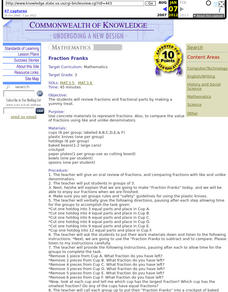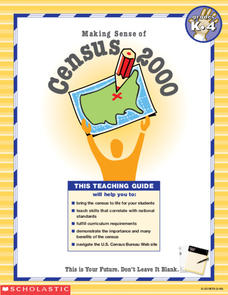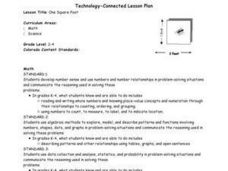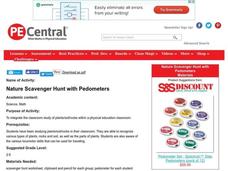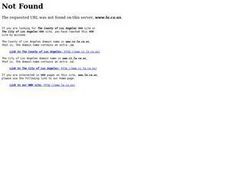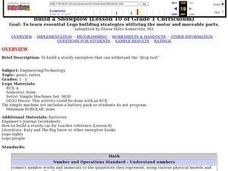Curated OER
Making Sense of the Census
In this unit of lessons, students make sense of the Census. They examine why a census is taken and participate in activities.
Curated OER
How Many Months?
Students investigate the first Peter the Mint Eagle, who lived at the Philadelphia Mint from 1830 to 1836. They determine how many months Peter was there and use pictures, numbers, equations, and/or words to explain how they came up with...
Curated OER
One Square Foot
Students identify, describe, count, tally, and graph life found in one square foot of land.
Curated OER
Leprechaun Treasure Hunt
Students play a relay race game that gives them points for finding and retrieving hidden items. They record data on a graph.
Curated OER
Nature Scavenger Hunt with Pedometers
Students integrate the study of plants/soil/rocks within a physical education classroom.
Curated OER
Developing Relationships with Older People
Students read books and view movies about older people. They write a questionnaire to interview older people at a retirement center, interview the people, record their information on graphs, and write follow-up letters.
Curated OER
Build a Snowplow
Students design and build a snowplow using LEGO materials. They compete in an Engineer's Challenge to clear a path through Styrofoam peanuts.
Other
Nearpod: Place Value: Fall Edition
For this lesson, young scholars will use base ten blocks and a place value chart to show their understanding of two-digit and three-digit numbers. They will also use place value to compare numbers.
Other
Rice Romp: Place Value Lesson Plan
Take a look at the mathematics involved in the story "One Grain of Rice". Included is a lesson plan, geared toward 2nd-grade math students, about place value. A link to a quiz on the story is included.
Khan Academy
Khan Academy: Naming and Ordering Numbers Lesson
Get ready for your Praxis Core Math test with this lesson over naming and ordering numbers. You will review the skills being tested for this topic and complete practice problems.
Better Lesson
Better Lesson: Is the Statement True or False?
Second graders use their knowledge of place value to determine whether a comparison statement is true or false.
Better Lesson
Better Lesson: Mentally Speaking!
Using base ten blocks and place value, 2nd graders explore how to become more fluent in adding and subtracting two-digit numbers without regrouping.
Better Lesson
Better Lesson: We Can Guess the Number
Understanding place value is critical to the Common Core Standards for second grade. Without a concrete understanding, 2nd graders may not fully grasp the meaning of the digits.
Better Lesson
Better Lesson: Moving Along in Tens
Grouping by tens reinforces the understanding of place value
University of Texas at Austin
University of Texas: Elementary Math Club: Number Paths
Learners explore connections between addition, subtraction, and multiplication. In addition, young scholars review place value and learn about the distributive law. The lesson plan includes an overview and a lesson toolkit.
CK-12 Foundation
Ck 12: Math Grade 2
Browse resources related to second-grade math standards. Click on a topic for interactive lessons, videos, and extra practice.
Better Lesson
Better Lesson: Comparing Temperatures
Second graders should be able to recognize what makes one number greater or smaller than another, using place value understanding which is crucial to Common Core mastery. This lesson combines math and science by having students order...
Better Lesson
Better Lesson: Writing and Solving Number Stories
We can apply math to almost every part of the day and make math have a purpose for students.
Better Lesson
Better Lesson: Larger Numbers: A Tie to Social Studies
I want my students to realize that numbers are everywhere and math is applicable to almost all other subjects. Geography offers a perfect opportunity for students to make this connection.
Better Lesson
Better Lesson: Let's Review
Revisit, Revisit, Revisit! Students need repeated exposure to math concepts to really understand how they work.
Better Lesson
Better Lesson: Using a Pattern to Solve a Problem
Patterns are prevalent in all levels of math. Common Core Standards expect students to be able to use structure - like that found in repeating the patterns of odd and even numbers or counting by 5s or 10s - to solve problems (MP7).
Better Lesson
Better Lesson: Pets, Pets and More Pets
Second graders love to talk about pets and in this lesson they can share how many pets they have.
Better Lesson
Better Lesson: Patterns Make Ten
This lesson builds a foundation for adding larger numbers which is supported by the Common Core standards for second grade.


